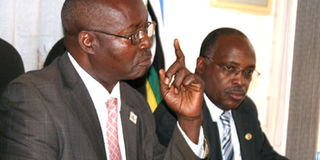Government reduces power tariffs

DELIVERING THE GOOD NEWS: Minister of State for Energy Hon. Simon D’ujanga (L) and Electricity Regulatory Authority (ERA) CEO Eng. Dr. Frank SSebowa (R) addressing the press on Monday. PHOTO BY ISAAC KASAMANI
What you need to know:
- Domestic tariffs will reduce by 9.5 per cent from Shs426.1 to Shs385.6 shading off Shs40 per unit.
- Commercial tariffs will reduce by 10 per cent from Shs398.8 to 358.6 per unit
- Medium industries by 9.9 per cent from Shs369.7 to Shs333.2
- Large industries will decrease by a marginal 1 per cent from Shs187.2 to Shs184.8 and street-lights from Shs403 to Shs364.6.
Electricity consumers will start off the New Year on a happy note after the government on Monday announced a reduction in power tariffs by an average 8 per cent across the board. The new tariffs are expected to take effect on January 1, 2010.
According to the new schedule, domestic tariffs will reduce by 9.5 per cent from Shs426.1 to Shs385.6 shading off Shs40 per unit, commercial tariffs will reduce by 10 per cent from Shs398.8 to 358.6 per unit, medium industries by 9.9 per cent from Shs369.7 to Shs333.2, large industries will decrease by a marginal 1 per cent from Shs187.2 to Shs184.8 and street-lights from Shs403 to Shs364.6.
“The worse days are over, even if there is increasing demand it cannot be to the extent it was before and with the construction of the Karuma and Bujagali, [electricity dams] we will be on top of the game,” the State Minister of Energy, Eng. Simon D’ujanga, said yesterday.
Addressing a news conference at the media centre, the Chief Executive Director Electricity Regulatory Authority (ERA), Dr Frank Ssebowa, said ERA received a Shs8 billion subsidy for the first quarter of January to March 2010 to keep Ugandan industries competitive in the region, create more jobs and make manufactured goods affordable.
“Large industrial consumer tariffs were to rise but a strategic decision was taken to subsidise them to the country’s advantage,” Dr Ssebowa said.
Stronger currency
The reduction in power tariffs follows an application by electricity companies including Umeme – power distributor; Uganda Electricity Transmission Company Ltd and the Uganda Electricity Distribution Company Ltd and Eskom to the regulator to review power tariffs for 2010.
Dr Ssebowa attributed the reduction to increased energy generation by new entrants including; Troder power - Bugoye, Electromaxx - Tororo and Kinyara Sugar works- Masindi.
He said lower levels of loss targets for 2010 from 4 per cent to 3.85 per cent for UETCL and 28 from 31.6 per cent for Umeme also helped to scale down the tariffs.
A stronger local currency against the US dollar and Umeme’s reduced working capital allowance days to 30 compared to 60 in 2009 also made it logical to reduce power tariffs in the new year. Eng. D’ujanga said though the reduction is still small, it marks the beginning of government’s efforts to make electricity a basic need and lubricant in the production process affordable and available to Ugandans.
“I am glad that for the first time, ERA has reduced electricity tariffs for all customer categories in line with government’s objective of making electricity affordable to majority of Ugandans,” he said.
Eng. D’ujanga, however, said to ensure further reductions in electricity tariffs – expected to be proportional to other East African countries - it is desirable to minimise the sector inefficiencies including high power losses, poor customer service and low quality supply. He said contrary to normal practice; the new tariffs will be reviewed on a quarterly basis depending on inflation rate and other factors.
Debt waiver
Umeme currently suffers from over 30 per cent losses especially through power theft. On his part, Dr Ssebowa also said the government needs to either differ or waive the debt service obligation of the Uganda Electricity Board.
“If that had happened, it would have led to a further reduction in tariffs of about 17 per cent,” he said.
A recent investigation into the activities of Umeme by a commission found that the body was facing high power losses while charging expensively for their service. The government plans to introduce pre-paid electricity in Kampala to allow consumers pay for the amount of units they would like to use.
A pilot project is already underway in the districts of Kibale, Bundibugyo, Kanungu and Parder.




